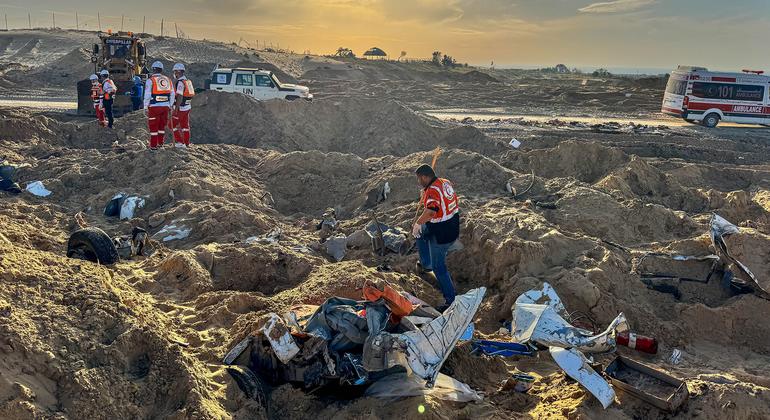Attacks on health establishments have doubled between 2023 and 2024 and more than 900 health workers were killed last year, the agency reported.
The humanitarian workers were also killed in record numbers in 2024. However, 2025 even exceeds these dark statistics at a time when the financing of humanitarian work is shrinking and supporting the services established over the decades are struggling to function.
The special Al-Shifa medical surgery building in the central city of Gaza has been reduced to rubble.
Assault on the Gaza health system
The almost two year war has devastated the Gaza health system, leaving thousands of people without access to essential services. Now, as famine settles down, false layers, premature births and low birth weight cases have increased, while deaths of newborns increase, warned the United Nations agency.
Pull quote: Life must continue even when the bombs are triggered.
“Because the delivery room was under direct fire, I delivered babies in the hospital corridors,” said Ayda, a senior midwife in northern Gaza. “For lights, we used mobile phones. Despite the lack of supplies and water, our hands continued to operate. Life must continue even when the bombs are triggered. ”
Since October 2023, the World Health Organization (WHO) has documented more than 720 attacks against health care in Gaza, with at least 1,580 killed health workers and unknown figures arrested and held by Israel. Among them was Ayda, who just days after sharing his story, was killed in an air strike with 37 members of his family.
Dr. Khalid Badreldin finished his studies at Ibrahim Malik hospital in Khartoum, who is now in ruins.
Delivered devastation in Sudan
In a domain of rubble that was part of Ibrahim Malik hospital in Khartoum, Dr. Khalid Badreldin, reproductive health analyst with Unfpa In Sudan, remembers having carried out his first surgical intervention and having delivered his first baby there.
“Now I find it like that,” he said, moving the now closed hospital, which was once a large supplier of emergency treatment and maternal and neonatal services. The hospital has joined more than 80% of health establishments in Sudan conflict areas which are no longer operational.
Meanwhile, the midwives of Khartoum, the capital, take “huge risks to reach women at home,” said Hawaa Ismael, who works in Kararai Health Center supported by UNFPA.
“It was exhausting, working day and night, but it is our duty, and I am proud of what we did.”
On the other side of the country, the staff of the El Fasher maternity hospital was attacked, with a midwife killed when his house was bombed on Thursday and another kidnapping.
Haiti’s spiral crisis
Clinics and hospitals have been deliberately targeted in the crisis that has obtained Haiti in the past 18 months, more weakening a health system already hampered after years of conflict, looting and financial collapse.
In Haiti, people carrying their business flee in near darkness.
The state university hospital, the largest in the country, was attacked during its reopening ceremony in December 2024, after a 10 -month closure, with several people killed, according to information. The same month, the armed gangs set fire to the Bernard Mevs hospital in Port-au-Prince, the capital, and in April, the attacks forced the Mirebalais university hospital to close.
The organized gangs lead a brutal campaign to take control of the capital, with rampant sexual violence. It is estimated that 1.2 million women and girls have an urgent need for protection against sexist violence, but due to the current insecurity, three of the four UNFPA safe spaces in Port-au-Prince have recently been forced to close and move. Since access to emergency services remains extremely limited, only one quarter of rape survivors receive care during the 72 -hour critical period.
Ukraine’s largest pediatric health center, the Okhmatdyt Children’s Hospital in kyiv, was struck on July 8, 2024 in one of the worst missile attacks against the country.
Heavy telechoration in Ukraine
Since January 2025, the World Health Organization (WHO) has recorded more than 300 attacks by Russia against health establishments, services and staff in Ukraine, where women and girls are often forced to find safer places to take shelter and give birth.
I was afraid of giving birth, but life continues. We want to live too.
“Each day brings stress,” said Anastasiia de Sloviensk, in the Frontline Donetsk region. “Even if there is no immediate strike, the nearby fights are noisy and constant. I was afraid of giving birth, but life continues. We want to live too. »»
Its region does not have a neonatal intensive care unit and although doctors can carry out a cesarean section, they could not provide complete care if complications were. As it approaches its due date, Anastasiia has traveled some 20 km to reach the Kharkiv regional perinatal center despite the submission of the city regularly subject to bombing, drone strikes and artillery bombings.
The response workers who help women and anastasiia are often faced with risks.
“When we arrive on attack sites or in case of violence, we do not have time to slow down,” said Roman, who works with a mobile psychosocial support team from UNFPA in Dnipro. “It is as if our own reactions are pending. It is only later, when we look back and discuss it, we realize how difficult it was. “
Under fire in Dr Congo
In the Democratic Republic of eastern Congo (DRC), most establishments providing maternal health care have been bombed or looted.
The Loti Kubuya Money Loti Honey assists a recently moved woman who gave birth in a refuge in Goma, Dr. Congo.
Indeed, only a third of hospitals in the region and one in five health centers are able to operate. UNFPA mobile health teams are often the only option that women have.
Moved since February 2023, Francine Toyata recalled her recent trip through “Darkness and Chaos” with her mother to reach a mobile health clinic supported by the UNFPA to give birth in the Ratshuru territory of the northern province of Kivu.
“It is for women like Francine that we do this work,” said Nelly, her midwife.
As the conflict intensifies, the bombs began to strike camps for internal displaced people, and the mobile health clinics and the listening centers were also looted and destroyed.
“We were not safe,” added Nelly. “We need more support to meet these urgent needs.”
Originally published at Almouwatin.com








